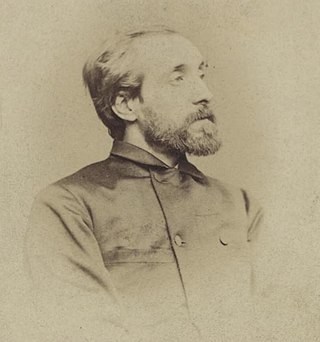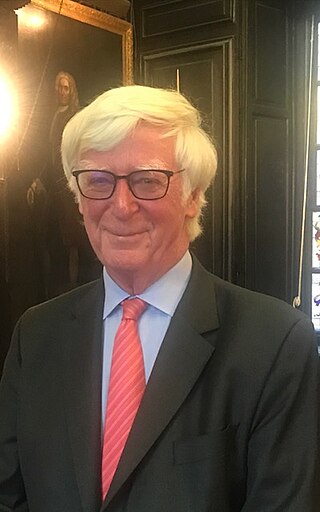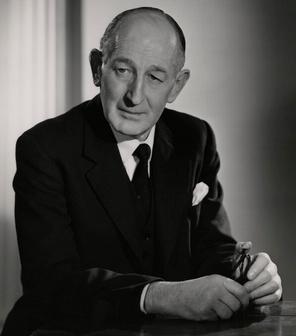Related Research Articles

Orthopedic surgery or orthopedics is the branch of surgery concerned with conditions involving the musculoskeletal system. Orthopedic surgeons use both surgical and nonsurgical means to treat musculoskeletal trauma, spine diseases, sports injuries, degenerative diseases, infections, tumors, and congenital disorders.

Hip replacement is a surgical procedure in which the hip joint is replaced by a prosthetic implant, that is, a hip prosthesis. Hip replacement surgery can be performed as a total replacement or a hemi/semi(half) replacement. Such joint replacement orthopaedic surgery is generally conducted to relieve arthritis pain or in some hip fractures. A total hip replacement consists of replacing both the acetabulum and the femoral head while hemiarthroplasty generally only replaces the femoral head. Hip replacement is one of the most common orthopaedic operations, though patient satisfaction varies widely between different techniques and implants. Approximately 58% of total hip replacements are estimated to last 25 years. The average cost of a total hip replacement in 2012 was $40,364 in the United States, and about $7,700 to $12,000 in most European countries.

An implant is a medical device manufactured to replace a missing biological structure, support a damaged biological structure, or enhance an existing biological structure. For example, an implant may be a rod, used to strengthen weak bones. Medical implants are human-made devices, in contrast to a transplant, which is a transplanted biomedical tissue. The surface of implants that contact the body might be made of a biomedical material such as titanium, silicone, or apatite depending on what is the most functional. In 2018, for example, American Elements developed a nickel alloy powder for 3D printing robust, long-lasting, and biocompatible medical implants. In some cases implants contain electronics, e.g. artificial pacemaker and cochlear implants. Some implants are bioactive, such as subcutaneous drug delivery devices in the form of implantable pills or drug-eluting stents.

Hugh Owen Thomas was a Welsh orthopaedic surgeon. He and his nephew Robert Jones have been called "the Fathers of orthopaedic surgery".

The Nuffield Orthopaedic Centre (NOC) is an orthopaedic hospital, with strong affiliations to the University of Oxford. It provides routine and specialist orthopaedic surgery, plastic surgery and rheumatology services to the people of Oxfordshire. Specialist services, such as the treatment of osteomyelitis and bone tumours, and the rehabilitation of those with limb amputation, congenital deficiency and neurological disabilities, are provided for patients from across the UK and abroad. It is managed by the Oxford University Hospitals NHS Foundation Trust.
Sir John Charnley, was an English orthopaedic surgeon. He pioneered the hip replacement operation, which is now one of the most common operations both in the UK and elsewhere in the world, and created the "Wrightington centre for hip surgery". He also demonstrated the fundamental importance of bony compression in operations to arthrodese (fuse) joints, in particular the knee, ankle and shoulder.
The Journal of Bone and Joint Surgery is a biweekly peer reviewed medical journal in the field of orthopedic surgery. It is published by the non-profit corporation The Journal of Bone and Joint Surgery, Inc. It was established as the Transactions of the American Orthopedic Association in 1889, published by the American Orthopedic Association. In 1903, volume 16 of the Transactions became the first volume of the American Journal of Orthopedic Surgery, which was renamed Journal of Orthopaedic Surgery in 1919 and also became the official journal of the British Orthopaedic Association. The journal obtained its current name in 1921. As of 2016, it had a Journal Citation Reports impact factor of 4.8 and ranking of 10/197 (surgery), 2/76 (orthopedics).

Sean Patrick Francis Hughes is emeritus professor of orthopaedic surgery at Imperial College London where he was previously professor of orthopaedic surgery and head of the department of surgery, anaesthetics and intensive care. Earlier in his career he had been professor of orthopaedic surgery at the University of Edinburgh.
"Professor" Derek McMinn is a British orthopaedic surgeon and inventor who practised in Birmingham, United Kingdom at the BMI Edgbaston Hospital until his suspension in 2020. McMinn is currently under police investigation for allegedly keeping the body parts of thousands of patients over a 25-year period.

Sir Robert Jones, 1st Baronet, was a Welsh orthopaedic surgeon who helped to establish the modern specialty of orthopaedic surgery in Britain.
Implant failure refers to the failure of any medical implant to meet the claims of its manufacturer or the health care provider involved in its installation. Implant failure can have any number of causes. The rates of failure vary for different implants.

Sir Harry Platt, 1st Baronet, FRCS, KStJ was an English orthopaedic surgeon, president of the Royal College of Surgeons of England (1954–1957). He was a founder of the British Orthopaedic Association, of which he became president in 1934–1935.
The following outline is provided as an overview of and topical guide to trauma and orthopaedics:
Ashok Rajgopal is an Indian orthopaedic surgeon, credited with close to 20,000 Arthroscopic and over 35,000 Total Knee Arthroplasty surgeries and reported to be one of the most experienced in his field in India. He was honoured by the Government of India in 2014, by bestowing on him the Padmashri, the fourth highest civilian award, for his services to the fields of orthopaedic surgery. He has also been awarded the Dr. BC Roy award by the Medical Council of India to "Recognize the Best Talents in Encouraging the Development of Specialties in Different Branches in Medicine" for 2014.

Robin Sydney Mackwood Ling, was an English surgeon who invented the Exeter hip system, a hip replacement. As an orthopaedic surgeon at the Princess Elizabeth orthopaedic hospital, Exeter, he co-operated with an engineer, Dr. Clive Lee from the University of Exeter, to develop a new hip replacement. Their work led to improved quality of life for millions of people.

John Ivor Pulsford James was a British orthopaedic surgeon. He was professor of orthopaedic surgery at the University of Edinburgh from 1958 to 1979. Most commonly known as "JIP", he was secretary then president of the British Orthopaedic Association which later awarded him its honorary fellowship. James attracted orthopaedic specialists to work in Edinburgh, encouraging them to develop an interest in a specialist area of orthopaedics, and in this way he was able to establish a comprehensive regional orthopaedic service. He made contributions to hand surgery and surgical treatment of scoliosis, and was a prime mover in promoting specialist training and qualification in orthopaedic surgery in the UK.

Sir Herbert John Seddon was an English orthopaedic surgeon. He was Nuffield Professor of Orthopaedic Surgery at the University of Oxford, where his work and publications on peripheral nerve injuries gained him an international reputation. His classification of nerve injuries forms the basis of that in use into the 21st century. He went on to become director of the new Institute of Orthopaedics in London and subsequently the first Professor of Orthopaedics in the University of London. In this role he directed basic science research into orthopaedic conditions and developed postgraduate training in orthopaedic surgery. He was President of the British Orthopaedic Association, and was knighted in 1964 for services to orthopaedics.

Raju Vaishya is an Indian researcher with contributions in the field of orthopaedics. He is former President and founder member of Indian Cartilage Society (2018–19) and Founder President of Arthritis Care Foundation. He has established a center for Autologous Chondrocyte Implantation (ACI) at Indraprastha Apollo Hospitals, New Delhi, India. Instrumental (PSI) in starting the first cartilage club in Delhi, to enhance the awareness about the cartilage science and regenerative treatments used in Orthopaedics. He has the credit of doing the first preplan patient specific instruments (PSI) total knee arthroplasty, in Northern India in May 2013.

Christopher Lewis Colton is an English orthopaedic surgeon and Professor Emeritus in Orthopaedic and Accident Surgery at the University of Nottingham. He is a past president of both the British Orthopaedic Association and of the AO Foundation.
Justin Peter Cobb is a British professor of orthopaedic surgery at Imperial College London, known for introducing medical robotics into orthopaedic surgery. He is a member of the Royal Medical Household and was royal orthopaedic surgeon to the Queen. He is on the staff at King Edward VII's Hospital (KEVII) and is civilian advisor in orthopaedics to the Royal Air Force (RAF). His research has also included themes relating to designing new devices such as for ceramic hip resurfacing, 3D printing in orthopaedics, and training in surgical skills. He is a director of the MSk laboratory based in the Sir Michael Uren Hub.
References
- 1 2 3 "About BOA". boa.ac.uk. 2013. Archived from the original on 16 February 2014. Retrieved 5 June 2013.
- ↑ Duthie, R. B. (September 2010) [2004]. "Platt, Sir Harry, first baronet (1886–1986)". Oxford Dictionary of National Biography . Oxford Dictionary of National Biography (Online ed.). Oxford University Press. doi:10.1093/ref:odnb/40077 . Retrieved 20 July 2013.(Subscription or UK public library membership required.)
- ↑ Cowell, Henry R. (2000). "A Brief History of The Journal of Bone and Joint Surgery". Clinical Orthopaedics and Related Research. 374. Ovid Technologies (Wolters Kluwer Health): 136–144. doi:10.1097/00003086-200005000-00012. ISSN 0009-921X.
- ↑ Watt, Holly; Newell, Claire (24 October 2012). "Faulty medical implants investigation: Patients failed by poor implant regulation, say surgeons - Telegraph". The Daily Telegraph . London. ISSN 0307-1235. OCLC 49632006. Archived from the original on 25 October 2012.